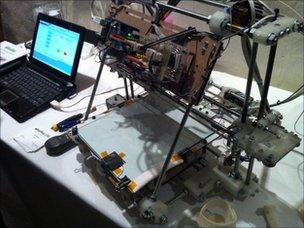High tech hopefuls at the Founders Forum
- Published
- comments

It's claimed that this 3D printer could create copies of itself for everyone on the planet in just 18 days
Where do you go to find the hot new start-ups that could be the next big thing in technology?
In Europe one answer is the Founders Forum, an extraordinary event which brings together successful entrepreneurs, business angels and chief executives to network - and to meet firms they might invest in.
Amongst the start-ups that have laid out their wares in previous years in front of the big money crowd that the Founders Forum's impresario Brent Hoberman assembles in a five star country hotel are success stories like Tweetdeck, Shazam and Playfish.
At the end of this year's two day event, which had started with an evening in Downing Street, a small group of journalists was allowed in to watch the high tech fashion show.
On the catwalk, as well as some nervous entrepreneurs explaining why their firms were going places fast, were scientists with some ideas for the next decade, plus a couple of projects that were already known success stories.
We heard from the founder of Angry Birds about the 51 unsuccessful games his firm had made before creating its huge worldwide hit.
We heard the story of M-Pesa, the mobile money transfer system which is transforming banking in Kenya. And we saw German scientists wrestling with technology that might drive a car with brain-power alone.
But I've picked out three presentations from businesses that seemed to impress the jaded crowd of gazillionaires the most.

Efe Cakarel believes he can succeed without breaking the US market
Mubi aims to transform the experience of watching movies online, and its exuberant founder told us that he could do that without conquering the US market.
Turkish-born Efe Cakarel was educated at MIT and Stanford, started his business in Silicon Valley, but now runs it out of London. If you want to be in the entertainment business London and New York are the places, he told me later.
Mubi is a social site for sharing your love of independent movies, or in its own words an online movie theatre where you watch, discover, and discuss auteur cinema.
Despite the American spelling Mr Cakarel isn't aiming at the US - he told us that only 13% of the world's internet users were now American, leaving a much bigger market to be addressed elsewhere. And, to whoops from the crowd, he announced that a deal had just been signed with Sony to put Mubi on its internet-connected televisions.
Spencer Hyman, formerly of another successful London start-up last.fm, told us about the one form of media which has yet to find a proper digital marketplace.
Many more people visit museums and galleries than go to football matches but where online can you share, discuss and buy art, from the old masters to new work by aspiring artists?
Artfinder aims to be the digital space for both artists and art lovers, with a big and growing database of works from galleries around the world. It will offer its community of users a place to share their favourite pictures, buy original works, even print out limited editions.
There will be an iPad app, and an image recognition system which will enable you to hold up a smartphone to a picture in a gallery and learn all about it. You can't help wondering just how the site will deal with copyright issues - what's to stop me printing out my own copy of a modern masterpiece without paying?
But Spencer Hyman says at the heart of Artfinder is provenance, giving everyone assurance about where works of art come from. And the firm has some big name investors including Reid Hoffman - as the founder of LinkedIn and an early backer of Facebook, he knows a bit about tech trends.
But the entrepreneur who both wowed and charmed the audience the most was a man who confessed he was nearer 60 than 50, a boffin far from the image of the pushy young entrepreneur.
Adrian Bowyer was showing off a 3D printer, a technology that is currently exciting enormous interest, along with a certain amount of puzzlement about its end purpose.
His RepRap though had an intriguing twist - the machine can print out the parts to replicate itself. Mr Bowyer painted an intriguing vision of one machine being replicated within 18 days to provide enough printers for every person on the planet - though just as we aren't knee-deep in rabbits that was unlikely to happen.
He showed us products made by the printer, from children's plastic shoes to a model of a gothic cathedral. You can even print out a key - keys are actually alarmingly simple - and use it for a week or so before you need to print another. It's like MP3 sharing but for real solid stuff, Mr Bowyer told us.
Will his vision of a new industrial model where £500,000 machine tools are replaced by home printing of anything we need ever be realised? Maybe not - but the inventor of the RepRap intrigued and amused us with a glimpse of a different way of running the world, and you can't ask more than that.